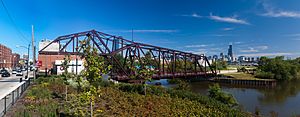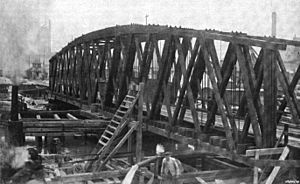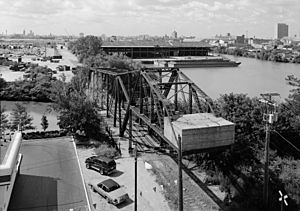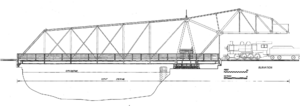Cherry Avenue Bridge facts for kids
Quick facts for kids Cherry Avenue Bridge |
|
|---|---|

Cherry Avenue bridge from North Avenue road bridge
|
|
| Coordinates | 41°54′37.1″N 87°39′19.9″W / 41.910306°N 87.655528°W |
| Crosses | North Branch Canal of the Chicago River |
| Locale | Chicago |
| Heritage status | Chicago Landmark |
| Characteristics | |
| Design | bob-tail swing bridge |
| Total length | 230 feet (70 m) |
| Longest span | 134.5 feet (41.0 m) |
| History | |
| Designer | Chicago, Milwaukee and St. Paul Railway |
| Construction begin | 1901 |
| Construction end | 1902 |
The Cherry Avenue Bridge is a special kind of bridge in Chicago, Illinois. It's known as a "bob-tail swing bridge" because it can turn to let boats pass by. This bridge carries trains, people walking, and bikers over the North Branch Canal of the Chicago River.
It was built a long time ago, between 1901 and 1902, by a company called the Chicago, Milwaukee and St. Paul Railway. This type of bridge is quite rare, which means there aren't many like it. Because it's so unique and important, it was named a Chicago Landmark in 2007.
Where is the Cherry Avenue Bridge?
The Cherry Avenue Bridge is located in Chicago at 41°54′37.1″N 87°39′19.9″W / 41.910306°N 87.655528°W. It runs north and south, crossing the North Branch Canal of the Chicago River. Its main job is to provide railroad access to Goose Island.
Goose Island is an industrial area in the Near North Side part of Chicago. The railroad track on the bridge is a special line that branches off from the main Union Pacific tracks. This line continues for about 0.5 miles (0.80 km) south onto Goose Island.
How Old is the Cherry Avenue Bridge?
Goose Island is not a natural island. It was made by people in the 1850s when they dug the North Branch Canal. In 1871, a railroad company started building tracks from Goose Island. This company later became part of the Chicago, Milwaukee and St. Paul Railway.
The Cherry Avenue Bridge was built in 1901 and 1902. It replaced an older bridge that had been there for about 20 years. This bridge was very important because it was the only way for trains to get onto Goose Island.
Over the years, different railroad companies used the bridge. In 2007, the Chicago Terminal Railroad took over. The City of Chicago bought the bridge in 2008. They fixed it up in 2008 and 2009. They added new parts and lights to make it safe for people to walk and bike across.
What Makes the Bridge Special?
The Cherry Avenue Bridge is one of only two "bob-tail swing bridges" built by the Chicago, Milwaukee & St. Paul Railway on the Chicago River. It runs north and south. One end of the bridge sits on a special turning point, called a pivot pier, on the north side of the canal.
The longer part of the bridge, called a Pratt truss arm, is about 134.5-foot (41.0 m) long and 40-foot (12 m) high. This part crosses the water. The shorter part of the bridge is about 70-foot (21 m) long. It holds a very heavy counter-weight, weighing about 280,000-pound (130,000 kg), which helps the bridge balance.
Even though it was designed to swing open, the bridge doesn't turn anymore. When it was first built, it could swing almost completely to the east to let boats pass. The bridge was made for a single train track, but it also has a sidewalk on its east side for people to use.
 | DeHart Hubbard |
 | Wilma Rudolph |
 | Jesse Owens |
 | Jackie Joyner-Kersee |
 | Major Taylor |




